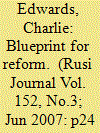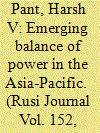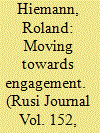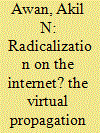| Srl | Item |
| 1 |
ID:
077463


|
|
|
|
|
| Publication |
2007.
|
| Summary/Abstract |
Collaboration between departments must no longer be seen as an accessory of government in response to modern security challenges, but as necessity
|
|
|
|
|
|
|
|
|
|
|
|
|
|
|
|
| 2 |
ID:
077468


|
|
|
|
|
| Publication |
2007.
|
| Summary/Abstract |
In an article based on her address to the Institute on 10 May 2007, the Foreign Secretary outlines the security threats that climate change poses. While conflict over resources is not new, the catastrophic scale of climate change, if unchecked, will lead to violence of vastly greater magnitude. As a result, new and innovative ideas must be developed to tackle the problem, including that many changes must come from within; we are all our own worst enemies.
|
|
|
|
|
|
|
|
|
|
|
|
|
|
|
|
| 3 |
ID:
077467


|
|
|
|
|
| Publication |
2007.
|
| Summary/Abstract |
is almost conventional wisdom now that the centre of gravity of global politics has shifted from Europe to the Asia-Pacific. In recent years we have witnessed the rise of China and India, the gradual assertion by Japan of its military profile and a significant shift in the US global force posture in favour of Asia-Pacific. The debate now is whether the Asia-Pacific will witness rising tensions and conflicts in the coming years or whether the forces of economic globalization and multilateralism will lead to peace and stability. Will Europe's past be Asia's future?
|
|
|
|
|
|
|
|
|
|
|
|
|
|
|
|
| 4 |
ID:
077469


|
|
|
|
|
| Publication |
2007.
|
| Summary/Abstract |
The question remains: 'could we do it again today' assuming, of course, that we were not fully tied up in Iraq and Afghanistan. This article will reexamine the logistic lessons of the Falklands War and compare them against our present capability. To do this, advice has been taken from current experts in the Ministry of Defence and from the Commando Logistic Regiment Royal Marines, that has just returned from Afghanistan. First we need to examine the key logistic phases of the Land operation: the mobilization, the re-stow at Ascension Island, the logistical plan and the lessons from the campaign itself.
|
|
|
|
|
|
|
|
|
|
|
|
|
|
|
|
| 5 |
ID:
077464


|
|
|
|
|
| Publication |
2007.
|
| Summary/Abstract |
The recent decision by Britain to renew its nuclear deterrence underscores the fragile state of the NPT. This article outlines the key points of the NPT, lists some violations of the NPT by nuclear and non-nuclear states, and then discusses how the international community should proceed with Iran. According to the treaty, Iran has an 'inalienable right' to pursue nuclear power for peaceful means. Even if Iran does develop nuclear weapons, it is likely to use them as a counter-balance to Israel's stocks. The international community should seek to generate an environment of goodwill to come to a negotiated settlement of the crisis
|
|
|
|
|
|
|
|
|
|
|
|
|
|
|
|
| 6 |
ID:
077465


|
|
|
|
|
| Publication |
2007.
|
| Summary/Abstract |
Curbing North Korea's development of nuclear weapons has long been one of the main challenges for US foreign policy. The approach of the Bush Administration has been grounded in a preference for a confrontational posture. Recently, US policy has undergone a significant change in dealing with the DPRK. Washington has endorsed a policy it once dismissed at best as counterproductive and at worst as appeasement: engaging the North Korean regime. This article seeks to explain the Administration's newfound flexibility toward the DPRK. It reflects on recent changes in both the international strategic and the US domestic political environments that have likely driven the Administration to revoke its hard-line stance
|
|
|
|
|
|
|
|
|
|
|
|
|
|
|
|
| 7 |
ID:
077466


|
|
|
|
|
| Publication |
2007.
|
| Summary/Abstract |
Nepal is back to normal, but the transition to post-insurgency has brought social change. The end of the Maoist insurgency has signalled also the end of an era for the Nepalese royal family. In particular, the young and active element of the population has a more globally attuned expectation of their quality of life and right to self-determination. But significant obstacles to peace implementation remain. Resources are limited and cannot stretch to cover delays; intercommunal violance may be just over the horizon; and most crucially, the state has failed to recreate its monopoly of violence. If the government fails to impose order, then local factions may take power for themselves
|
|
|
|
|
|
|
|
|
|
|
|
|
|
|
|
| 8 |
ID:
077471


|
|
|
|
|
| Publication |
2007.
|
| Summary/Abstract |
The spectre of a retrograde, puritanical and belligerent ideology may seem anachronistic in the twenty-first century. However, Jihadism (as opposed to the classical reified conception of Jihad) is a thoroughly modern phenomenon. The Internet, that most contemporary of media, is increasingly its medium of choice: Jihadist websites, forums and blogs flourish. This article examines the audience, the functions of the internet for Jihadists, how Jihadist media derives legitimacy, radicalization, and Jihadist media as an alternative paradigm.
|
|
|
|
|
|
|
|
|
|
|
|
|
|
|
|
| 9 |
ID:
077461


|
|
|
|
|
| Publication |
2007.
|
| Summary/Abstract |
The Home Secretary in his keynote address outlines the threats facing Britain today. Globalization provides threats as well as opportunities. Crucially, the Critical National Infrastructure that empowers us, also empowers our adversaries. The government is therefore re-focusing the Home Office to do that by concentrating on neighbourhood policing through the normal work of the traditional British bobby, organized crime at home and abroad and managing immigration together with the fight for counter-terrorism
|
|
|
|
|
|
|
|
|
|
|
|
|
|
|
|
| 10 |
ID:
077470


|
|
|
|
|
| Publication |
2007.
|
| Summary/Abstract |
international terrorism, and hopefully thereby ultimately overcome its excesses, then it is crucial first to examine the reasons for this clash of values and second to unravel the perceptions that fuel the passions behind the terrorist's mask. Terrorism is a tactic, not the cause, of a larger struggle. Hence, it needs to be tackled by policies as well as policing, sociology as well as soldiering. It requires a combination of measures that will persuade the hydra to release its grip on the rock, rather than cut off its many replaceable tentacles. In the case of people, this is a matter of winning hearts and minds
|
|
|
|
|
|
|
|
|
|
|
|
|
|
|
|
| 11 |
ID:
077462


|
|
|
|
|
| Publication |
2007.
|
| Summary/Abstract |
A nation's security may be at risk in many different ways. Natural disasters and emergencies, such as severe weather and flooding are indiscriminate their impact. Additionally, man-made security threats, such as war, terrorism and organized crime, are varied, innovative and often designed to cause maximum disruption by breaching social norms in terms of target and method. A nation has at its disposal a whole raft of tools to reduce the risks associated with the threats and hazards it faces
|
|
|
|
|
|
|
|
|
|
|
|
|
|
|
|